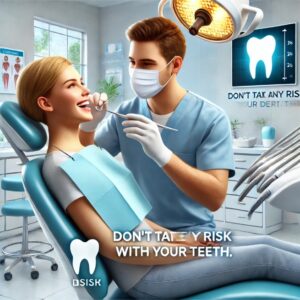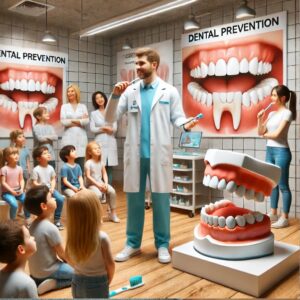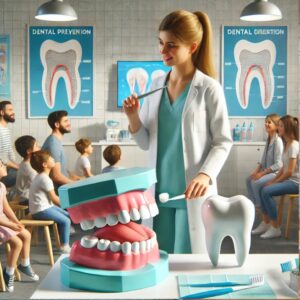Don’t Take Any Risk with Your Teeth: Comprehensive Dental Care for a Healthy Smile
Introduction to Dental Health
Maintaining optimal dental health is crucial not just for a beautiful smile but for overall well-being. Dental problems, if left untreated, can lead to severe health issues, including heart disease, diabetes, and even complications during pregnancy. This article aims to provide an in-depth look at why you shouldn’t take any risks with your teeth and how comprehensive dental care can protect your oral health.

Understanding Dental Care
What is Dental Care?
Dental care encompasses all the practices and treatments involved in maintaining the health of your teeth and gums. It includes preventive measures, routine check-ups, diagnostic services, treatments, and rehabilitative care. Comprehensive dental care ensures that every aspect of your oral health is taken care of, preventing minor issues from becoming major problems.
The Importance of Preventive Dental Care
Daily Oral Hygiene
Preventive dental care starts with daily oral hygiene practices. Proper brushing and flossing are essential to remove plaque and prevent cavities and gum disease.
- Brushing: Brush your teeth at least twice a day using fluoride toothpaste. Ensure you brush all surfaces of your teeth and your tongue.
- Flossing: Floss daily to remove food particles and plaque between teeth where a toothbrush can’t reach.
- Mouthwash: Use an antiseptic mouthwash to kill bacteria and freshen your breath.
Regular Dental Check-Ups
Regular dental check-ups are critical in maintaining oral health. These visits allow your dentist to detect and treat issues early, preventing more serious problems.
- Professional Cleanings: Dental cleanings remove plaque and tartar buildup that regular brushing and flossing can’t.
- Examinations: Dentists check for cavities, gum disease, and other oral issues. Early detection ensures simpler and less invasive treatments.
- X-Rays: Dental X-rays help identify problems not visible during a regular exam, such as impacted teeth, abscesses, or jawbone damage.
Advanced Diagnostic Services in Dentistry
Non-Invasive Diagnostic Techniques
Modern dentistry offers advanced diagnostic tools that are non-invasive and highly effective in detecting oral health issues.
- Digital X-Rays: Provide detailed images with lower radiation exposure compared to traditional X-rays.
- Intraoral Cameras: Small cameras that allow dentists to see detailed images of the inside of your mouth.
- Laser Cavity Detection: Uses laser technology to detect early signs of cavities.
Therapeutic Interventions and Treatments
Restorative Dentistry
Restorative dentistry focuses on repairing and restoring damaged teeth to their normal function and appearance.
- Fillings: Used to repair cavities. Composite fillings match the color of your teeth, providing a natural look.
- Crowns: Caps that cover damaged or decayed teeth, restoring their shape and strength.
- Bridges: Used to replace missing teeth by anchoring artificial teeth to adjacent natural teeth.
Cosmetic Dentistry
Cosmetic dentistry improves the appearance of your teeth, boosting your confidence and overall well-being.
- Teeth Whitening: Removes stains and discoloration, giving you a brighter smile.
- Veneers: Thin shells placed over the front of teeth to improve their appearance.
- Orthodontics: Braces and aligners straighten teeth and correct bite issues.

Rehabilitation and Long-Term Management
Dental Implants
Dental implants are a permanent solution for missing teeth. They involve placing a titanium post into the jawbone, which acts as an artificial tooth root.
- Stability and Comfort: Implants are stable and feel like natural teeth.
- Longevity: With proper care, dental implants can last a lifetime.
- Bone Health: Implants stimulate the jawbone, preventing bone loss.
Periodontal Care
Periodontal care focuses on the health of your gums and the structures supporting your teeth.
- Scaling and Root Planing: Deep cleaning procedures that remove plaque and tartar from below the gum line.
- Gum Surgery: For severe cases of gum disease, surgery may be needed to restore gum health.
- Maintenance: Regular check-ups and cleanings to monitor and maintain gum health.
The Role of Technology in Modern Dentistry
Innovative Tools and Techniques
Advancements in dental technology have revolutionized the way dental care is provided.
- 3D Printing: Used for creating dental crowns, bridges, and dentures with precision.
- Laser Dentistry: Minimizes discomfort and speeds up healing for various dental procedures.
- Digital Impressions: Provide accurate models of your teeth without the need for messy molds.
Benefits of Technology in Dental Care
- Accuracy: Improved diagnostic and treatment accuracy.
- Comfort: Less invasive and more comfortable procedures.
- Efficiency: Faster treatment times and reduced need for follow-up visits.

D on’t take any risk with your teeth. Comprehensive dental care is essential for maintaining not only a healthy smile but also your overall health. From preventive measures and routine check-ups to advanced diagnostics and innovative treatments, every aspect of dental care plays a crucial role in ensuring your teeth and gums remain healthy. Embrace a proactive approach to your dental health and enjoy the benefits of a beautiful, confident smile for a lifetime.
Invest in your oral health today, and safeguard your future well-being. Regular visits to your dentist, combined with good oral hygiene practices, can prevent many dental problems and keep your smile bright and healthy. Remember, a healthy mouth is a gateway to a healthy body.


 Italy
Italy
 Spain (Soon)
Spain (Soon)
 France (Soon)
France (Soon)
 Greece (Soon)
Greece (Soon)
 Portugal (Soon)
Portugal (Soon)
 Holland (Soon)
Holland (Soon)

